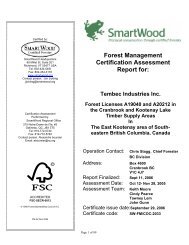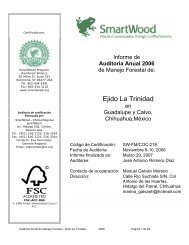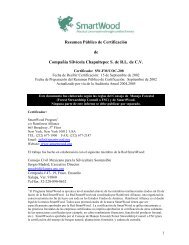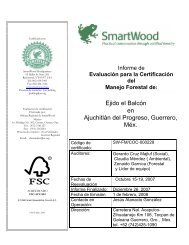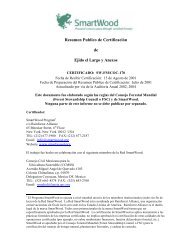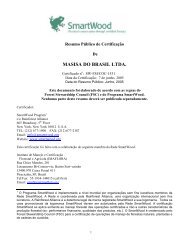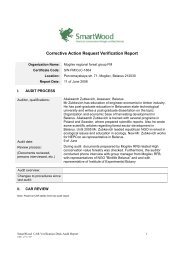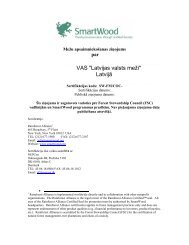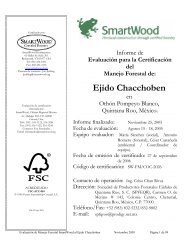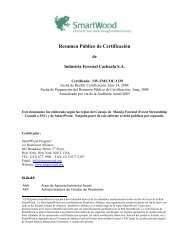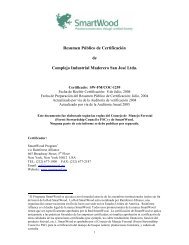Title: Rainforest Alliance/SmartWood Interim Standard for Assessing ...
Title: Rainforest Alliance/SmartWood Interim Standard for Assessing ...
Title: Rainforest Alliance/SmartWood Interim Standard for Assessing ...
You also want an ePaper? Increase the reach of your titles
YUMPU automatically turns print PDFs into web optimized ePapers that Google loves.
6.5 Written guidelines shall be prepared and implemented to: control erosion; minimise<br />
<strong>for</strong>est damage during harvesting, road construction, and all other mechanical<br />
disturbances; and protect water resources.<br />
6.5.1 All <strong>for</strong>est operations with the potential <strong>for</strong> negative environmental impact (as<br />
identified in 6.1) shall have written guidelines defining acceptable practices which<br />
are available to <strong>for</strong>est managers and supervisors. Such operational guidelines shall<br />
meet or exceed national or regional best management practices.<br />
6.5.2 Maps and/or work plans shall be produced at a scale that allows effective<br />
supervision of soil and water resource management and protection activities.<br />
6.5.3 Topographic maps have been prepared be<strong>for</strong>e logging or road construction occurs.<br />
6.5.4 Topographic maps should specify areas suitable <strong>for</strong> all-weather harvesting or dryweather<br />
only; and indicate locations <strong>for</strong> extraction (or haul) roads, loading ramps<br />
(or log yards), main skid (or snig) trails, drainage structures, buffer zones, and<br />
conservation areas.<br />
6.5.5 Training shall be given to FME staff and contractors to meet guidance<br />
requirements.<br />
6.5.6 Road construction, maintenance and closure standards shall be followed in the<br />
<strong>for</strong>est.<br />
6.6 Management systems shall promote the development and adoption of<br />
environmentally friendly non-chemical methods of pest management and strive to<br />
avoid the use of chemical pesticides. World Health Organisation Type 1A and 1B<br />
and chlorinated hydrocarbon pesticides; pesticides that are persistent, toxic or<br />
whose derivatives remain biologically active and accumulate in the food chain<br />
beyond their intended use; as well as any pesticides banned by international<br />
agreement, shall be prohibited. If chemicals are used, proper equipment and<br />
training shall be provided to minimise health and environmental risks.<br />
6.6.1 Forest managers shall employ silvicultural systems, integrated pest management<br />
and vegetation control strategies that result in the least adverse environmental<br />
impact. Pesticides are used only when non-chemical management practices have<br />
been proven ineffective or cost prohibitive.<br />
6.6.2 If chemicals are used, the following requirements apply:<br />
• A complete inventory of chemicals shall be provided by the FME and detailed<br />
inspections of storage areas or other facilities validate that inventory is<br />
complete and accurate;<br />
• Records shall be kept of all chemical used by the FME including name of the<br />
product, location and method of application, total quantity of chemical used and<br />
dates of application.<br />
• Safe handling, application (using proper equipment) and storage procedures<br />
shall be followed; and,<br />
• Staff and contractors shall receive training in handling, application and storage<br />
procedures.<br />
6.6.3 Chemicals prohibited by the FSC (FSC-POL-30-601), those banned in Europe,<br />
U.S. and target country, or World Health Organization Type 1A or 1B, and<br />
chlorinated hydrocarbon pesticides shall not be used. The exception is when a<br />
<strong>for</strong>mal derogation has been granted by the FSC. In such cases, the FME follows<br />
the terms of the approved derogation.<br />
<strong>SmartWood</strong> FM <strong>Interim</strong> <strong>Standard</strong> Indonesia 2008 Page 20 of 49



